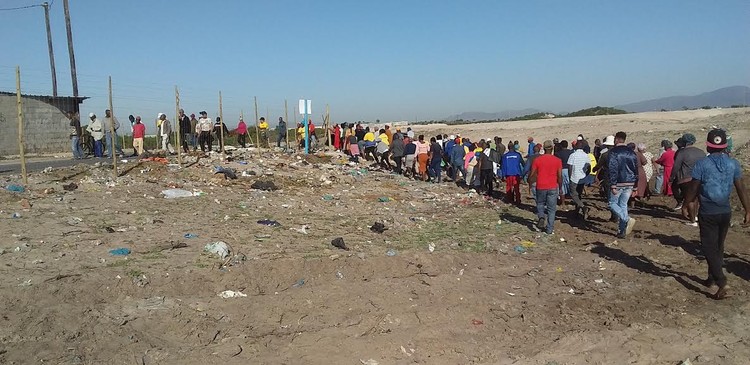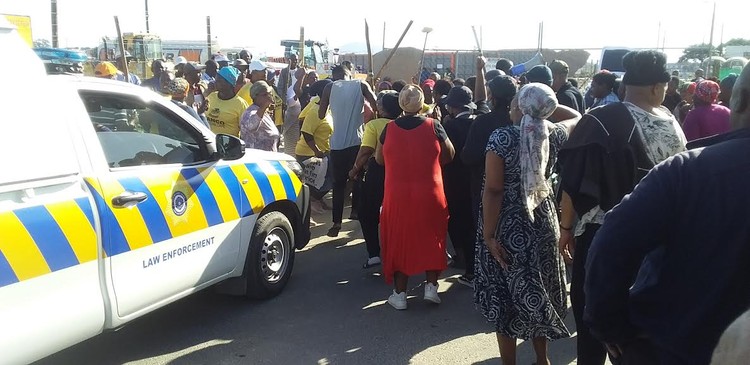Cape Town housing project brought to a halt in protest over jobs
Delft residents demand work on Symphony Way project
Protesters marched to the site of the Symphony Way housing project, demanding jobs. Photo: Nombulelo Damba-Hendricks
-
Protesters demanding Expanded Public Works Programme jobs (EPWP) brought the Symphony Way housing project in Cape Town to a halt on Wednesday.
-
They say people who live in the area should get preference on the project.
-
Some said they had registered on the City of Cape Town’s EPWP database but had not got jobs.
-
Protesters were read a court order obtained by the City interdicting them from entering the site or blocking access to it.
-
They dispersed after several hours.
Protesters demanding jobs brought the Symphony Way housing project in Cape Town to a halt on Wednesday. The protesters, from Delft, are demanding that 80% of the work on the project be given to people from their area.
The development is a partnership between the City of Cape Town and Airports Company South Africa (ACSA). Beneficiaries are from the Blikkiesdorp, Malawi Camp and Freedom Farm informal settlement.
Protesters said since the project started in March they had been negotiating with the contractor and the City of Cape Town asking to be considered for employment.
Three community leaders had been chosen to negotiate on behalf of the residents.
But the City of Cape Town was awarded an interim interdict on 1 June by the Western Cape High Court interdicting the three delegates Nonceba Saliyabo, Nothemba Klassen and Lennox May, and anyone else “attempting to prohibit the installation” of services from entering the site, or blocking the entrance.
When GroundUp arrived on Wednesday, protesters were on the site, forcing workers to stop working. They later moved outside and started singing at the entrance. In one song, residents sang that they no longer wanted the City of Cape Town database.
Phyllis Mali said she had registered on the database but had never benefited from it.
“I live next to the project but I’m not benefiting from it. Two of my children are unemployed, they are supposed to benefit from this project. I also want to be hired here,” she said.
She said they had raised this issue with the City and they were told that as long the person lives in Delft they can benefit from the project.
“For months we have been telling them to give our community leaders the names of the people they are hiring to verify if they live in this area. The City is refusing. The guards in this site are from other areas. There are people from Khayelitsha who are benefiting from this project while we are sitting at home unemployed,” she said.
Community leader Nureesa Fataar said every year she took completed forms to the City for registration on the database. “But when it comes to employment, our people are not benefiting. She said some of the protesters had been guarding the roadworks machines on the site, in the hope of getting employment.”
After three hours of singing outside, law enforcement officers, City officials and police came.
Four delegates from the community were called to join a meeting. One of the delegates, Adenaan Davids, said nothing was resolved at the meeting but they were shown a court order that they should not be protesting next to the site.
The court order from the Western Cape High Court was then given to residents to read out loud.
Police and law enforcement officials came. Protesters dispersed after eight hours. Photo: Nombulelo Damba-Hendrik
Saliyabo, one of the people named in the court order, said it came as a surprise that the City had applied for the interdict.
“When residents started protesting for jobs in April, the City said residents must elect delegates to negotiate with them. We were then elected to represent the interests of the community members. When they failed to meet residents’ demands instead of coming up with solutions they opt for court. We have been watching the same people benefiting from a number of projects here in Delft, now we are saying it is enough,” she said.
Protesters dispersed after eight hours of protesting. When they left they said they would no longer guard the machinery and if crime took place they should not be blamed.
The City of Cape Town had not responded to our request for comment by the time of publication. But in a statement on 8 June, the City’s media office said as of 30 April 2022, the City had created 32,958 Expanded Public Works Programme jobs in the 2021-22 financial year. Between 2017 and 2022, over 170 000 job opportunities had been created, in spite of lockdown, including for call centre workers, data capturing, cleaning, traffic wardens and auxiliary law enforcement officers. Some jobs had been created directly as contracts between the City and the workers, and others through the City’s contractors.
Mayco member for Urban Waste Management Grant Twigg has previously said that the City sources names on its database “for a specific community”, and “randomly selects candidates from this pool to guard against nepotism.”
He said opportunities “are randomly distributed, normally to members of the community in which the project will run”.
Next: Dodgy lawyer Lesley Ramulifho still doing work for Lottery
Previous: High Court finds spousal visa rules unconstitutional
© 2022 GroundUp. This article is licensed under a Creative Commons Attribution-NoDerivatives 4.0 International License.
You may republish this article, so long as you credit the authors and GroundUp, and do not change the text. Please include a link back to the original article.
We put an invisible pixel in the article so that we can count traffic to republishers. All analytics tools are solely on our servers. We do not give our logs to any third party. Logs are deleted after two weeks. We do not use any IP address identifying information except to count regional traffic. We are solely interested in counting hits, not tracking users. If you republish, please do not delete the invisible pixel.




